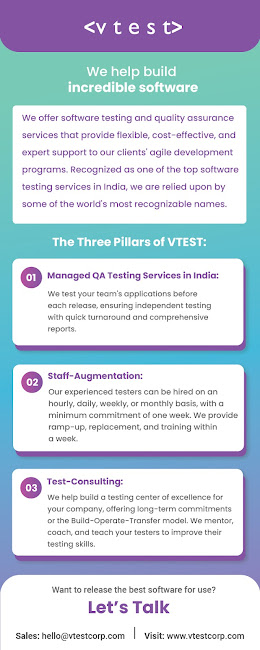5 Skills Every Software Tester Must Have
Software
testing is a procedure performed by a software tester
to execute either a computer program or application with an aim to find and fix software bugs. Software testing can also be understood as the process
that validates and verifies either of the software program, application or
product.
Being softwaretesting one of the most crucial things, it is very imperative that every
software tester should possess specific technical skills and in some, they need
to excel. What are those skills?
A tester with a good
understanding of requirements analysis, design and coding have great insight
into the defect life cycle. They can easily understand which area of code has
maximum defects and how it could be resolved by helping developers. There are
some good technical skills of a tester that help in preventing the defects from getting introduced in the delivered code.
Here we have mentioned 5 skills that every software tester must have.
1
Analytical and logical thinking
In order
to effectively identify the hidden errors, software testers must be
able to analyse the given business situation and judge all the possible
scenarios. They should be able to identify and solve unfamiliar problems.
2. Importance of Critical thinking
Critical thinking is a vital skill for a softwaretester. Testers should be able to ask questions, gather relevant information,
understand them effectively and draw his/her own well-reasoned conclusions and
solutions.
3. Basic knowledge
A good tester applies
knowledge that is attained with years of experience within the domain of
testing processes. The knowledge may be about the process, product, customers,
possible mistakes and ways to succeed
4. Creativity and
natural curiosity is a must
Being intellectually curious is a big part of being a
good tester, which is all about asking the right questions. They should be
curious about the various scenarios, cases, potential situations and should not
be easily discouraged.
5. Be Up to date
As we all know “times they are a-changing” even for organizations and business environments. So, approaches and processes that work well today can easily be obsolete tomorrow. ( Read more....)

Comments
Post a Comment